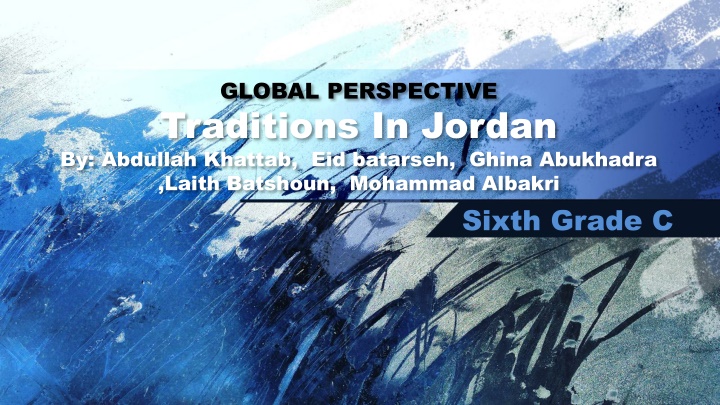
Jordanian Traditions: Eidiyah and Dabke Insights
Explore the cultural traditions of Jordan through Eidiyah, the tradition of giving cash to children during Eid, and Dabke, the traditional folk dance. Discover the significance of Eidiyah in spreading joy and teaching children about money, and the social importance of Dabke in Jordan and surrounding Arab nations.
Download Presentation

Please find below an Image/Link to download the presentation.
The content on the website is provided AS IS for your information and personal use only. It may not be sold, licensed, or shared on other websites without obtaining consent from the author. If you encounter any issues during the download, it is possible that the publisher has removed the file from their server.
You are allowed to download the files provided on this website for personal or commercial use, subject to the condition that they are used lawfully. All files are the property of their respective owners.
The content on the website is provided AS IS for your information and personal use only. It may not be sold, licensed, or shared on other websites without obtaining consent from the author.
E N D
Presentation Transcript
GLOBAL PERSPECTIVE Traditions In Jordan By: Abdullah Khattab, Eid batarseh, Ghina Abukhadra ,Laith Batshoun, Mohammad Albakri Sixth Grade C
Eidiyah Eidiyah
Eidiyah Ediyah-the tradition of giving cash to children during Eid. Giving children gifts during religious festivals is a tradition followed by families across the globe, in Jordan this tradition involves giving children money or gifts, those presents often take form of Eidiyah. Spending money distributed to children in Eid times. Eidiyah is referred to small amounts of money cash given to children by their parents and older relatives within a family.
We can see this tradition in Jordan and other Arab Countries. This tradition is practiced in most of religious festivals such as, Eid Al Fitr, Eid Al Adha, Christmas and Easter. Definitely not all families can give their children Eidiyah. Only families that have enough money can do it. Eidiyah is one way to spread the happiness and joy of Eid. It is also a way children could learn how to save their money and be responsible for it.
Reflection Reflection Eidiyah is a unique tradition for our region, as it is a great way to spread happiness and it teaches children how to save their money. Recourses: www.thenationalnews.com
Dabke Dabke
Dabke Dabke- the traditional dance in Jordan. The Dabke is the traditional folk dance in Jordan. The word Dabke is derived from the Arabic word meaning (stomping of the feet). It can be danced as women only, men only, or in mixed company. The general movements of the dance includes standing in a circle where the dancers either hold hands or put their hands on the neighbors shoulders followed by a series of stomps and kicks.
It is performed at weddings and other happy occasions in Jordan and surrounding Arab nations. When Dabke dance was first created it was mainly danced in Lebanon, Jordan, Syria, Palestine, and some qusi-Bedouin tribes that were living in nearby territories. Dabke steps and rhythms have been passed down generation after generation, taught by mothers to sons, by older brothers to sisters. Dabke is a social dance, which means anyone and everyone can learn it! It is a way for our parents and families to teach more about our culture it s a source of both pride and happiness.
Reflection It is a great dance for groups and strangers to celebrate happy events and to show happiness. Recourses: www.wordlyrise.blogpost.com
Arabic coffee Arabic coffee
Arabic Coffee Arabic coffee- the welcoming drink in Jordan. Arabic coffee is a version of the brewed coffee Arabica beans. Most Arab countries throughout the Middle East have developed distinct methods for brewing and preparing coffee. Cardamom is an often added spice. Serving Arabic Coffee begins with poor it to the guest from right to left, and the host must serve the coffee to the guest with the right hand and hold the coffee pot with the left hand, and he must also make a light sound when he starts serving. In the origin Arabic coffee first found in Bedouin region ,now you can find it everywhere in Jordan.
Culturally, Arabic coffee is served during family gathering or when receiving guests. Now serving coffee in all occasions. The happy and the sad ones. All the people of Jordan practice this tradition, because it is not only a symbol of hospitality and trust, it is a traditional sign of respect and a way to bring people to gather. Arabic coffee is the key to conversation in the Bedouin Society, as it is away to welcome the guest and show the meanings of generosity.
Reflection Although I didn t try Arabic coffee, I would like to try it when I grow up, but at this age, it is a great way to learn and know more about my culture. Recourses: www.wonderstourism.com
